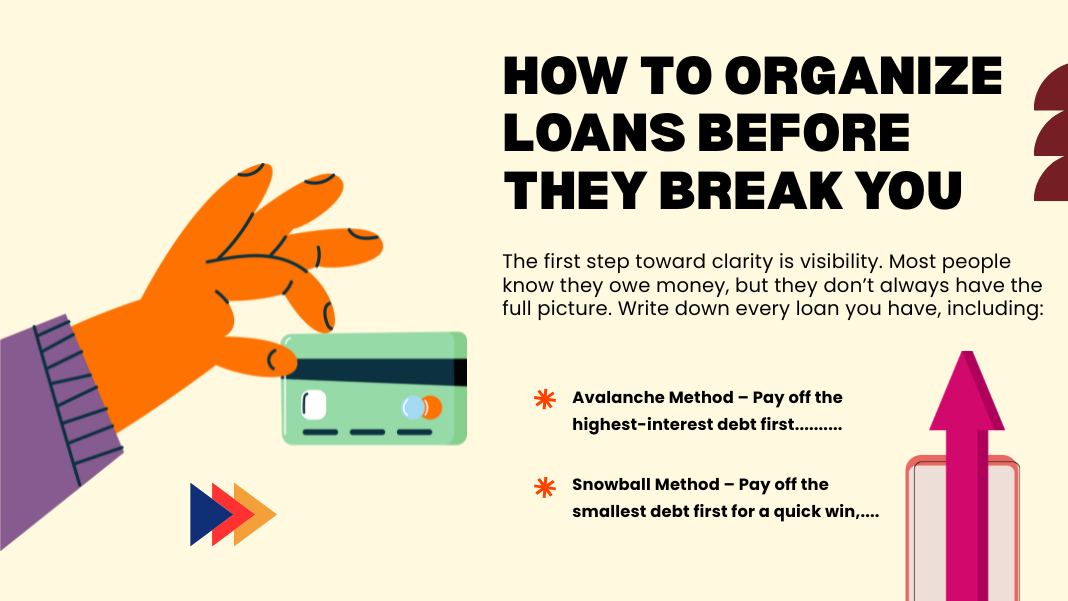Managing multiple loans can feel like carrying heavy chains around your neck. Whether it’s personal loans, student debt, credit card balances, or a mortgage, the stress of juggling payments can quickly spiral out of control. The good news is that you can get ahead of the chaos with the right strategies. Here’s how to organize your loans before they start controlling your life.
List Every Loan in One Place
The first step toward clarity is visibility. Most people know they owe money, but they don’t always have the full picture. Write down every loan you have, including:
- The lender’s name
- Current balance
- Interest rate
- Monthly payment amount
- Due date
Having this information in one document or spreadsheet gives you a bird’s-eye view of your debt. This eliminates surprises and helps you prioritize.
Understand Which Debt Costs You the Most
Not all loans are equal. A $1,000 credit card balance at 22% interest will drain you much faster than a $5,000 student loan at 6%. Rank your debts by interest rate to see which ones are bleeding your finances the most.
This step is crucial because it shows you where to focus your repayment energy. The debts with the highest interest should usually be your top priority, since they grow the fastest.
Choose a Repayment Strategy That Works for You
There are two popular repayment methods:
- Avalanche Method – Pay off the highest-interest debt first while making minimum payments on the rest. This saves the most money over time.
- Snowball Method – Pay off the smallest debt first for a quick win, then move to the next. This builds momentum and motivation.
Pick the one that fits your personality. If you need emotional wins to stay consistent, the snowball works better. If you want pure numbers and savings, avalanche is the way.
Consolidate or Refinance When Possible
If you’re managing too many payments, consolidation can simplify things. Loan consolidation or refinancing involves combining multiple loans into a single payment, often with a lower interest rate.
For example, transferring high-interest credit card debt to a lower-interest personal loan can make repayment faster and less stressful. However, always read the fine print—sometimes consolidation comes with fees or longer repayment terms.
Automate Your Payments
One of the easiest ways to avoid missed payments is to automate them. Set up automatic transfers from your bank account on or just before the due date.
Why this helps:
- Eliminates late fees
- Protects your credit score
- Reduces mental stress
Even if you can’t automate the full payment, at least set the minimum payment on auto-debit. This small step can save you from costly mistakes.
Track Your Progress Every Month
Debt repayment is not a “set it and forget it” process. Check your balances monthly to see progress and stay motivated. Use a spreadsheet, debt-tracking app, or even a whiteboard at home.
Visibly seeing your loan amounts decrease provides encouragement. It also highlights if one debt is still ballooning due to hidden fees or interest.
Cut Spending and Redirect Extra Money Toward Loans
Finally, no repayment plan works without freeing up cash flow. Review your budget and cut unnecessary expenses:
- Cancel unused subscriptions
- Cook at home instead of eating out
- Reduce impulse shopping
Every extra $20, $50, or $100 you put toward debt speeds up your timeline. Redirecting these small wins to your highest-priority loan can shave months, even years, off repayment.
Debt doesn’t have to control your life. By organizing your loans, choosing a repayment strategy, and staying disciplined, you can reclaim your financial freedom. It’s not about quick fixes—it’s about structure and consistency. The earlier you take charge, the faster you’ll escape the crushing weight of loans.
Frequently Asked Questions (FAQ)
1. What is the best way to organize multiple loans?
The best way is to list all loans, note interest rates, prioritize high-interest debt, and use debt snowball or avalanche repayment strategies.
2. Should I consolidate my loans into one payment?
Loan consolidation can simplify repayment and sometimes reduce interest, but it depends on your credit score and lender terms.
3. How can I avoid falling behind on loan payments?
Set reminders, automate payments, create a realistic budget, and build an emergency fund to stay ahead of due dates.

